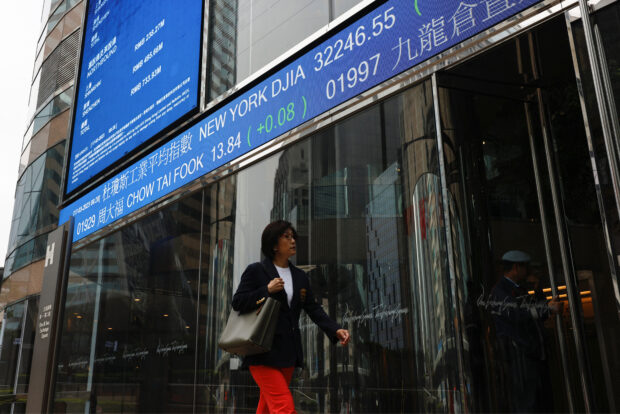
A woman walks past a screen displaying the Hang Seng Index at Central district, in Hong Kong, China March 17, 2023. REUTERS/Tyrone Siu/File photo
SYDNEY – Asian shares rose on Thursday as markets wagered that U.S. rates have peaked after more dovish remarks from Federal Reserve officials, while traders awaited the U.S. consumer inflation report later in the day for further monetary policy clues.
MSCI’s broadest index of Asia-Pacific shares outside Japan gained 0.7 percent to the highest level in three weeks. Tokyo’s Nikkei rallied 1.3 percent for a third straight day, climbing away from its five-month low hit last week.
Hong Kong’s Hang Seng index jumped 1.8 percent, driven by a 3-percent surge in banking shares after Central Huijin Investment, China’s state fund, raised stakes in the big four banks. China’s blue chips rose 0.7 percent.
Overnight, Wall Street closed higher after Federal Reserve minutes showed a growing sense of uncertainty around the path of the U.S. economy, with volatile data and tightening financial markets posing risks to growth and leading policymakers to extend a rate pause last month.
The recent buoyancy in sentiment also owe much to comments from more Fed officials suggesting rates there may have peaked, which triggered a welcoming pullback in Treasury yields.
U.S. Fed Governor Christopher Waller on Wednesday said higher market interest rates may help the Fed slow inflation, and let it “watch and see” if its own policy rate needs to rise again or not.
Waller has been among the most vocal advocates for higher interest rates to fight inflation, and his comments added weight to similar statements this week by Fed Vice Chair Philip Jefferson and Dallas Fed President Lorie Logan.
The dollar settled near a two-week low, but the yen is still under pressure at 149.09 per dollar, just a whisker away from the 150 level that could spur intervention from Japanese authorities.
Markets moved to further trim the chance of a Fed hike in November to just 9 percent, down from 13.2 percent a day earlier, and there is a 70 percent chance that the rate is already at its peak, according to CME FedTool.
With the long-awaited pivot for the Fed in sight, traders are bracing for the all-important U.S. consumer inflation report later in the day. Stakes are higher because a producer price inflation report came in hotter than expected on Wednesday.
Economists expect the headline consumer price index (CPI) to haven risen 0.3 percent in September from August and core CPI is seen steady at 0.3 percent.
Alan Ruskin, chief international strategist at Deutsche Bank AG, said an upside surprise in the core rate of 0.4 percent or more would catch investors off guard, although geopolitical risk is likely to deter the bond market from trading too bearishly on stronger data.
“The more lasting impact to the data would likely come from a 0.4-percent m/m core number, which would mean that the two most important data releases for September numbers (non-farm payrolls and CPI) would both be making a case for the Fed remaining hawkish.”
Long-dated treasury yields eased for a third straight sessions, also benefiting from some safe-haven demand from the ongoing conflict in the Middle East.
Ten-year yields eased 3 basis points to 4.5623 percent on Thursday, off from its 16-year high of 4.887 percent.
Oil prices extended their declines on Thursday after top OPEC producer Saudi Arabia pledged to help stabilize the market amid fears of supply disruption from the conflict between Israel and Palestine.
Brent futures eased 0.4 percent to $85.47 a barrel, after a 2-percent drop in the prior session. U.S. West Texas Intermediate crude fell 0.5 percent to $83.05, following a 2.9 percent plunge on Wednesday.
Spot gold was 0.2 percent higher at $1,876.77 per ounce, about the highest in two weeks.